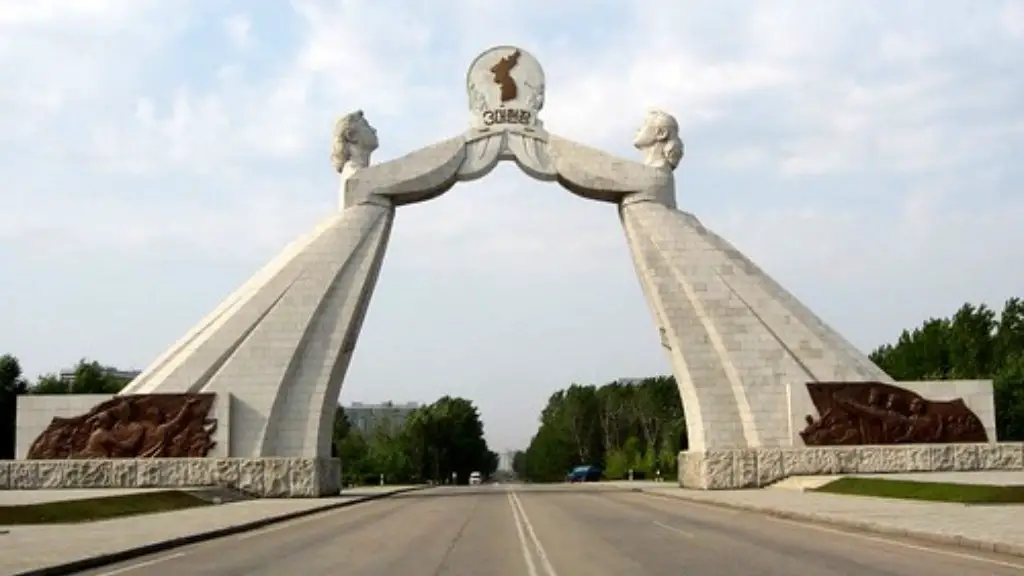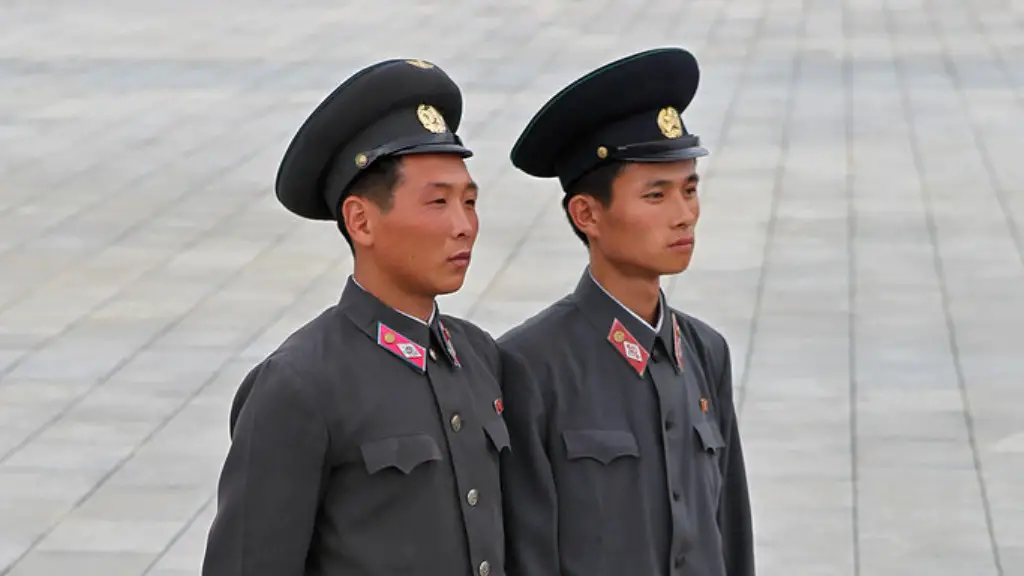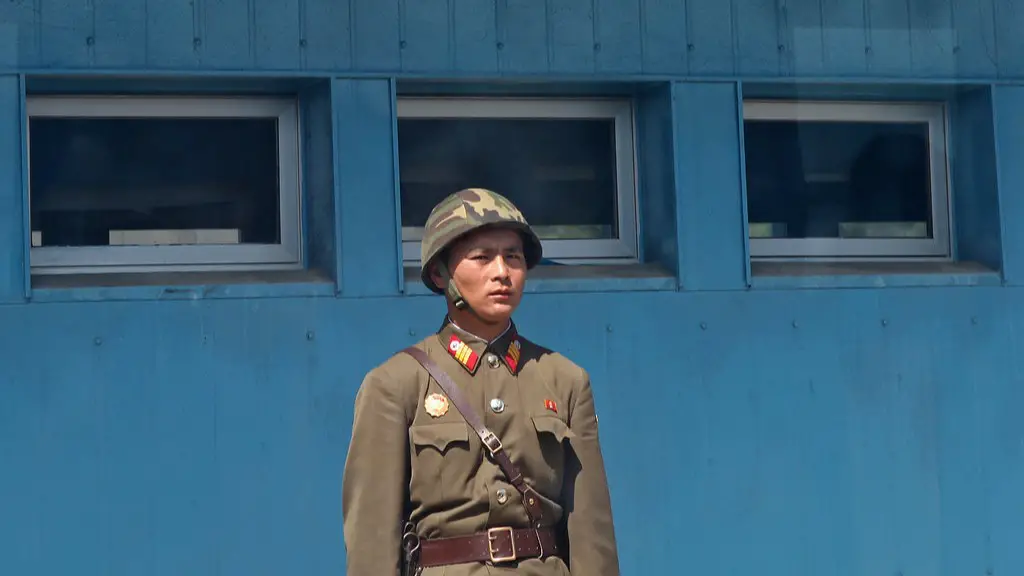China is a major global power and its alliance with North Korea has been a source of contention for much of the international community. For decades, the relationship between the two countries has been largely defined by the Cold War-era geopolitics. North Korea is increasingly seen as one of China’s most important strategic allies, but there is much uncertainty on exactly why China allies with North Korea in the first place.
One of the primary reasons for China’s alliance with North Korea is Beijing’s strategic goal of stability in the Korean Peninsula. Taiwan and Japan are two other neighbouring countries to China – both major US allies – which China perceives as a major threat. By maintaining close ties with North Korea, China hopes to reduce the influence of both countries and act as a counterweight should conflict break out. This could potentially be done by acting as intermediary between these countries in conflict resolution.
China also views North Korea as a buffer state between itself and US-influenced South Korea. Experts fear that if the North Korean regime collapsed, China would face increased US presence and influence in the region. This could have far-reaching implications for China, as it would disrupt the strategically vital global balance of power.
On the economic side, North Korea provides important access to minerals, metals and labour. China is North Korea’s largest trading partner and is also believed to be providing much-needed foreign aid to the country. A large number of North Korean workers also travel to China to earn money, which is then sent back home. This is a major source of foreign currency for North Korea.
Political Support
On the diplomatic front, China is one of the few countries that have remained diplomatically supportive of North Korea’s regime. This has been particularly evident in the interactions between the two countries in the United Nations Security Council. China has blocked UN resolutions that could have threatened North Korea’s political stability.
However, this support is not unconditional, as China has often been vocal in criticising North Korea’s nuclear programme. China has also attempted to convince North Korea to remain firmly in the Chinese political orbit and to take its guidance diplomatically. Despite the strained relationship between the two countries, a closer alliance still serves the interests of both sides.
Security Concerns
Many experts believe that one of the main reasons for China’s alliance with North Korea is to buffer itself from the US military presence in the region. With more than 28,000 US soldiers stationed in South Korea and US forces conducting regular military exercises in the region, China sees North Korea as a potential counterweight.
By maintaining close ties with North Korea, China is able to exert some level of control over the North Korean regime and potentially avert a conflict should tensions between South and North Korea escalate. This could potentially ensure that the region remains calm and stable, which benefits China’s interests.
However, tensions between North and South Korea as well as between China and the US has increased in recent years, with both sides posturing for military dominance in the region. Experts have warned that this could potentially lead to destabilisation in the region, a situation that could have dire consequences for China’s security interests.
Impact On The Region
The China-North Korea alliance has had a significant impact on the security dynamics in the region. With China’s backing, North Korea has been able to pursue its nuclear programme with relative impunity. North Korea’s nuclear programme has been a major cause for concern for much of the international community.
China’s backing for North Korea has also resulted in increased tension between the US and China. US President Donald Trump has repeatedly criticised China’s alliance with North Korea, claiming that it is allowing the country to continue its nuclear programme with the assistance of China. This has led to a deterioration in relations between the two countries.
At the same time, the US has also maintained close ties with South Korea, and both sides have conducted joint military exercises in the region in an attempt to deter North Korea. This has increased US influence in the region, which is perceived as a threat to China’s security interests.
Sanctions and Penalties
In an attempt to curb North Korea’s nuclear programme, the UN Security Council has imposed a number of sanctions against the North Korean regime. China, however, has been reluctant to fully enforce these sanctions, citing concerns about the potential destabilising effect they could have on the region.
China’s reluctance to enforce the UN sanctions has drawn criticism from the US and its allies in the region. The US has accused China of enabling North Korea’s nuclear programme through its continued backing of the country, and has threatened to impose its own sanctions on China.
However, experts have argued that the US’s refusal to accept China’s stance is counter-productive, noting that it could further strain the US-China relationship without tackling the root cause of the problem. Many believe that dialogue is the only way to resolve the tensions between the US and China over North Korea.
China’s Priorities
It is apparent that China’s alliance with North Korea is determined largely by geopolitics and economic interests. China’s priority is to maintain stability in the region and protect its own security interests, and its alliance with North Korea is a crucial component of this strategy.
China is one of the few countries that still have solid diplomatic ties with North Korea and this affords it a degree of leverage over the country. However, increased tensions between the US and China over North Korea could potentially worsen the situation.
China’s Diplomatic Role
China is often seen as the key to resolving the North Korean situation. Beijing has taken on the role of mediator in the past, attempting to bridge the divide between the North Korean regime and its opponents. It has also attempted to persuade North Korea to cooperate with UN sanctions against the country.
However, it can be argued that China’s role in this conflict has been limited. As long as the US and North Korea remain at loggerheads, it is unlikely that China’s diplomatic efforts will be successful. Ultimately, the only way to resolve the situation is through dialogue and diplomacy between all parties involved.
China’s Influence
It is clear that China has emerged as a major player in the North Korean situation, as it is one of the few countries that have maintained strong ties with the regime. This allows China to influence the situation to an extent, as it can potentially act as mediator between the US and North Korea.
However, China is also conscious of its own interests, and will likely take steps to protect them should tensions between the US and North Korea escalate. Ultimately, China’s influence in the region will depend on how diplomatically it manages the situation.




